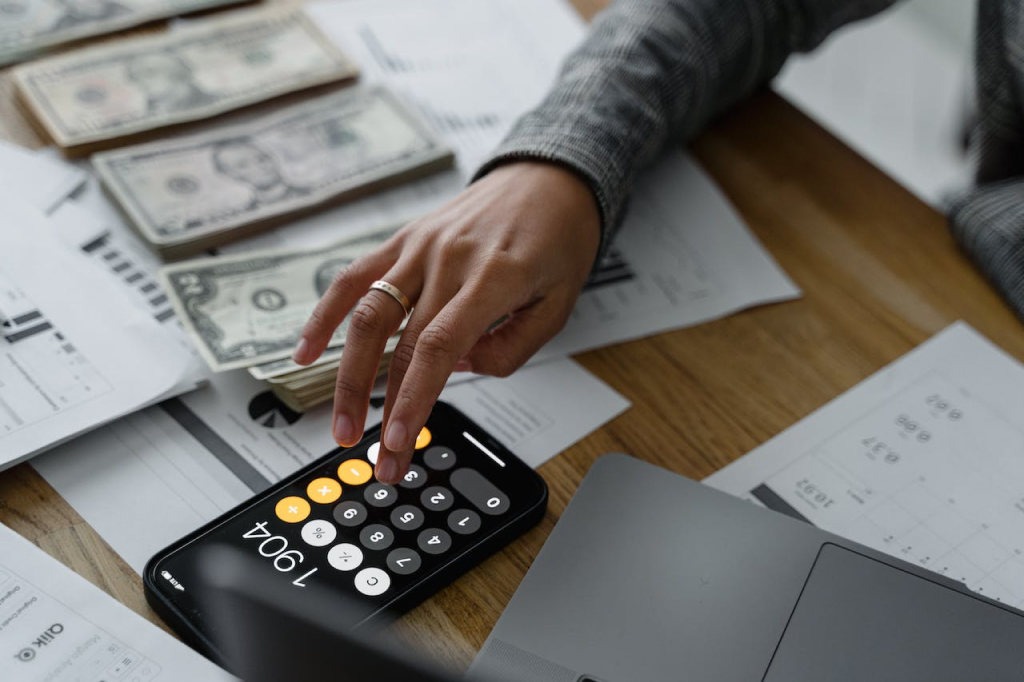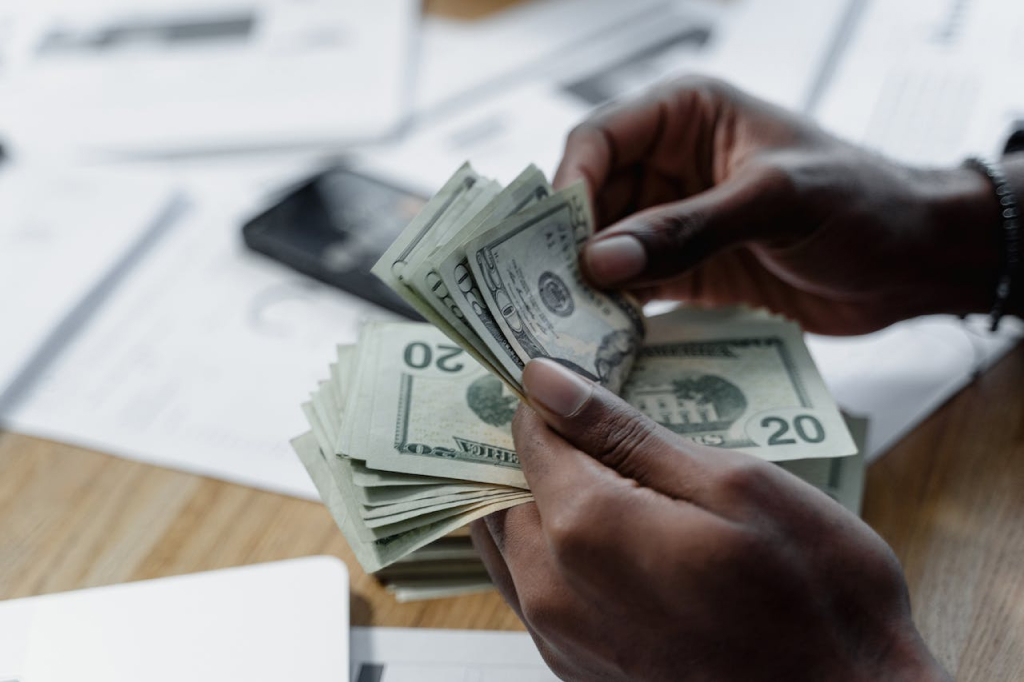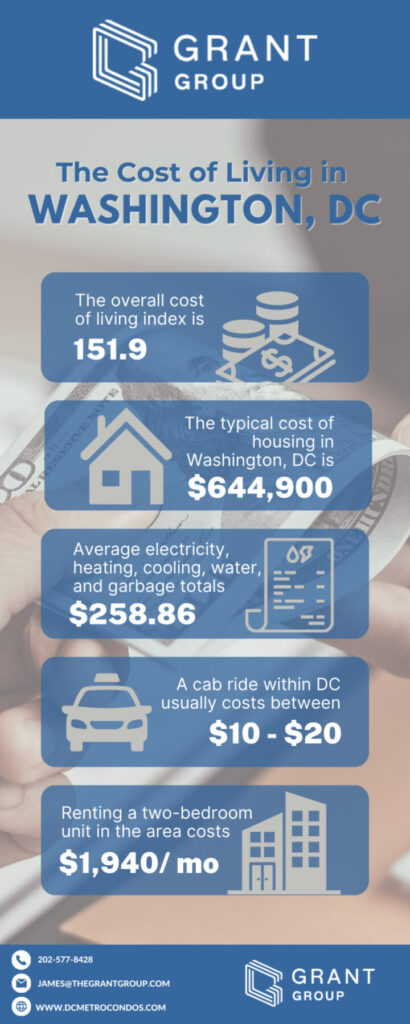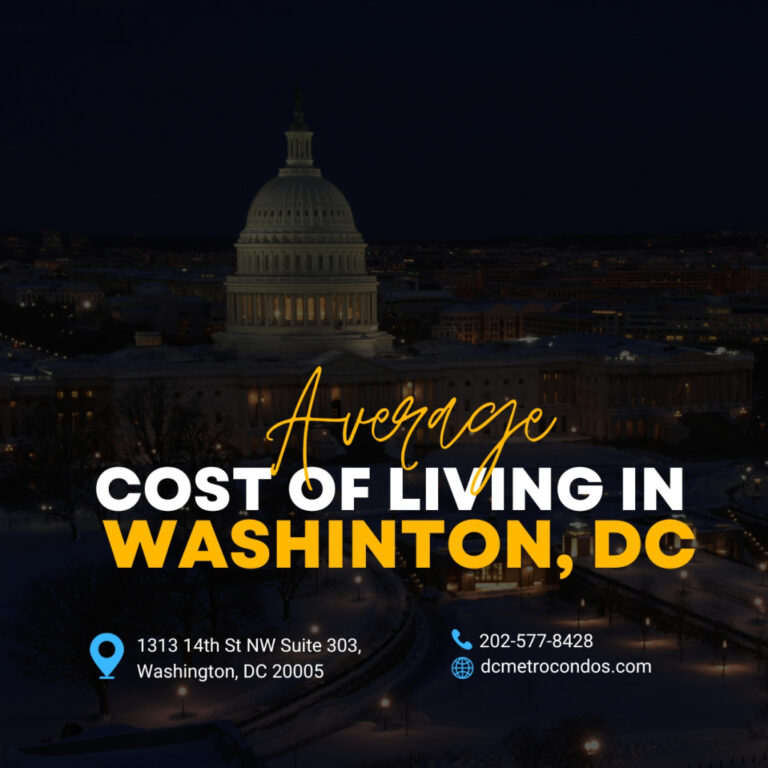Credit: Image by inboundREM | Source
The cost of living in a particular location is the amount of money an individual needs to cover their basic expenses. This includes housing, food, utility, transportation, healthcare, and miscellaneous expenses.
If you’re considering moving to the nation’s capital, learning the average cost of living in Washington, D.C. will allow you to compare the affordability of living in the district compared to your current location.

Photo by Tima Miroshnichenko
Cost of Living Index: Washington, D.C.
A cost-of-living index is particularly helpful if you are considering moving to Washington, D.C., and you want to see if living in this city would be beneficial for you, given your projected income.
Below is a table showing the cost of living in Washington, D.C., along with the state indexes, to give you an idea how expensive or affordable the basic expenses in this location are relative to the rest of the country.
| Cost of Living | Washington, D.C. | District of Columbia | United States |
|---|---|---|---|
| Overall | 151.9 | 151.2 | 100 |
| Grocery | 114.1 | 114.1 | 100 |
| Health | 95.5 | 95.1 | 100 |
| Housing | 231.5 | 230.5 | 100 |
| Utilities | 106 | 106 | 100 |
| Transportation | 135.3 | 135.3 | 100 |
| Miscellaneous | 175.9 | 160.1 | 100 |
From the information above, you can see that the overall cost of living index in Washington, D.C. is 151.9. This means that the total cost of housing, food, childcare, transportation, healthcare, taxes, and other necessities is 51.9% higher than the U.S. average.
You will notice that the figures under the column for “United States” are constantly at 100. This is because both locations are being compared to the national average.
To live comfortably in Washington, D.C., a minimum annual income of $123,480 for a family, and $68,400 for a single person is recommended.

Photo by RDNE Stock project
Housing Costs
Based on the table above, you’ll see that housing is the biggest driver of cost of living in Washington, D.C., 131.5% higher than the national average. The typical cost of housing in Washington, D.C. is $644,900, 90.7% more expensive than the national average of $338,100.
Renting a two-bedroom unit in the area costs $1,940 per month. This is 35.7% more than the national average of $1,430 and 5.2% more than the state average of $1,840. The table below shows the average rent for 1- and 3-bedroom apartments.
| Header #1 | Washington, D.C. |
|---|---|
| 1-Bedroom Apartment in the City Center | $2,752.17 |
| 1-Bedroom Apartment Outside of Center | $2,391.12 |
| 3-Bedroom Apartment in the City Center | $5,935.71 |
| 3-Bedroom Apartment Outside of Center | $4,161.11 |

Photo by Tima Miroshnichenko
Utilities
Considering that Washington, D.C. is generally an expensive city, its utilities are relatively low with a cost of living index of 106. This means that overall utility costs are 6% higher than the national average.
The table below shows the average electric bill in Washington, D.C., along with mobile phone, internet, and other basic utilities.
| Utilities | Washington, D.C. |
|---|---|
| Basic (Electricity, Heating, Cooling, Water, Garbage) for 85m2 Apartment | $258.86 |
| Mobile Phone Monthly Plan with Calls and 10GB+ Data | $69.69 |
| Internet (60 Mbps or More, Unlimited Data, Cable/ADSL) | $68.55 |

Photo by Gustavo Fring
Groceries and Food
Food costs in Washington, D.C. are 14.1% higher than the national average. For comparison, a three-course meal for two people at a mid-range restaurant in Washington, D.C., costs $115 while the national average is $75.
| Average Prices of Food Items at a Restaurant | Washington, D.C. |
|---|---|
| Meal at an Inexpensive Restaurant | $22.00 |
| Three-Course Meal for 2 People at a Mid-Range Restaurant | $115.00 |
| Combo Meal at a Fast-Food Restaurant | $12.00 |
| Domestic Beer (0.5-liter draught) | $8.00 |
| Imported Beer (0.33-liter bottle) | $10.00 |
| Cappuccino (regular) | $5.64 |
| Coke/Pepsi (0.33-liter bottle) | $2.56 |
| Water (0.33-liter bottle) | $2.60 |
Since dining at restaurants can be quite expensive, preparing meals at home offers a more budget-friendly option for Washingtonians. Below is a table showing the average cost of food items in grocery stores in the nation’s capital.
| Average Prices of Grocery Items | Washington, D.C. |
|---|---|
| Meal at an Inexpensive Restaurant | $22.00 |
| Three-Course Meal for 2 People at a Mid-Range Restaurant | $115.00 |
| Combo Meal at a Fast-Food Restaurant | $12.00 |
| Domestic Beer (0.5-liter draught) | $8.00 |
| Imported Beer (0.33-liter bottle) | $10.00 |
| Cappuccino (regular) | $5.64 |
| Coke/Pepsi (0.33-liter bottle) | $2.56 |
| Water (0.33-liter bottle) | $2.60 |
Since dining at restaurants can be quite expensive, preparing meals at home offers a more budget-friendly option for Washingtonians. Below is a table showing the average cost of food items in grocery stores in the nation’s capital.
| Average Prices of Grocery Items | Washington, D.C. |
|---|---|
| Milk (1 liter) | $1.15 |
| Loaf of Fresh White Bread (500g) | $4.30 |
| Eggs (regular, 12) | $4.65 |
| Rice (white, 1kg) | $5.61 |
| Local Cheese (1kg) | $18.01 |
| Beef Round or Equivalent Back Leg Red Meat (1kg) | $19.57 |
| Apples (1kg) | $5.59 |
| Bananas (1kg) | $2.72 |
| Oranges (1kg) | $6.48 |
| Tomatoes (1kg) | $6.59 |
| Potatoes (1kg) | $4.16 |
| Onions (1kg) | $3.54 |
| Lettuce (1 head) | $2.96 |
| Water (1.5-liter bottle) | $2.78 |
| Bottle of Wine (Mid-Range) | $15.00 |
| Domestic Beer (0.5-liter bottle) | $3.01 |
| Imported Beer (0.33-liter bottle) | $4.97 |

Photo by Adam Michael Szuscik on Unsplash
Transportation
There are several means of public transportation in Washington, D.C.
The Metrorail has six lines and 91 stations that service most of the city and all the major suburbs.
If you’re commuting somewhere the Metrorail doesn’t service, such as Georgetown, you can take one of Metro’s 325 bus routes. The DC Circulator bus system has six routes that connect commuters to the capital’s main attractions and popular neighborhoods.
Capital Bikeshare has more than 350 docking stations in Washington, D.C. Residents can register for free membership, giving them unlimited free 45-minute rides with no unlocking or travel fee. Rides longer than 45 minutes will cost $0.05/minute for a pedal bike.
A cab ride within DC usually costs between $10 and $20. The Yellow Cab Company of D.C. can be booked ahead of time, and all DC cabs now accept credit card payments.
Uber also allows customers to pay with a card—tip included. Black cars run about 50% more compared to a normal taxi. Uber cabs are the same plus a $2 surcharge.

Photo by Andrea Piacquadio
Healthcare
In the United States, the average cost of seeing a doctor without insurance is typically between $300 and $600. DC Healthy Families provides free health insurance to residents who meet certain income and U.S. citizenship or eligible immigration status to qualify for DC Medicaid.
Below, you’ll see the average costs of visits to health care practitioners and veterinarians, as well as the average price of prescription drugs.
| Healthcare | Washington, D.C. |
|---|---|
| Optometrist | $113.54 |
| Doctor | $120.54 |
| Dentist | $104.00 |
| RX Drug | $444.12 |
| Veterinarian | $58.60 |

Photo by Karolina Grabowska
Taxes
Local income tax rates in Washington, D.C. range from 4.0% to 10.75%. The sales tax rate is 6.0%. The property tax rate for residential property is 85 cents for every $100 of assessed value.
Homeowners and renters whose federal adjusted gross income (AGI) for the tax year is $57,600 or lower ($78,600 or lower if you’re age 70 or older) may be eligible for Homeowner and Renter Property Tax Credit. The maximum credit amount is $1250.
To be considered eligible, you must have lived in the home for the whole year, you must not be claimed as a dependent on anyone else’s return, and you should not have rented from a landlord whose property is exempt from property tax. This tax credit is refundable.

Conclusion
Washington, D.C., may be one of the most expensive cities in the nation, but it is undeniably one of the greatest places to live in the United States.
If you’re considering moving to Washington, D.C., let me show you your home options! You can call me at 202-577-8428 or send me an email at James@theGrantGroup.com so we can schedule an appointment and start discussing about your dream home.
Frequently Asked Questions
What is the average commute time in Washington, D.C.?
Commutes in Washington, D.C., are among the lengthiest in the country. On average, Washingtonians spend 43 minutes getting to and from work, while the average American commutes about 27 minutes.
What is the sales tax rate in Washington, D.C.?
The nation’s capital has a sales tax rate of 6%.
Is it possible to find affordable housing in Washington, D.C.?
Yes, the District offers a free affordable housing listing and search engine that provides information about properties participating in affordable housing programs as well as eligibility requirements, tools, and resources for tenants and home buyers.
